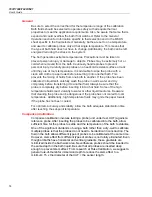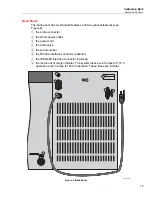
7037/7038/7040/7041
User's Guide
24
Cost
Cost of bath fluids may vary greatly, from cents per gallon for water to hundreds
of dollars per gallon for synthetic oils. Cost may be an important consideration
when choosing a fluid.
Commonly Used Fluids
Below is a description of some of the more commonly used fluids and their
characteristics.
Water
Water is often used because of its very low cost, availability, and excellent
temperature control characteristics. Water has very low viscosity and good
thermal conductivity and heat capacity which makes it among the best fluids for
control stability at low temperatures. Temperature stability is much poorer at
higher temperatures because water condenses on the lid, cools and drips into
the bath. Water is safe and relatively inert. The electrical conductivity of water
may prevent its use in some applications. Water has a limited temperature range,
from a few degrees above 0
°
C to a few degrees below 100
°
C. At higher
temperatures evaporation becomes significant. Water used in the bath should be
distilled or softened to prevent mineral deposits. Consider using an algaecide
chemical in the water to prevent contamination.
Ethylene Glycol
The temperature range of water may be extended by using a solution of 1 part
water and 1 part ethylene glycol (antifreeze). The characteristics of the ethylene
glycol-water solution are similar to water. Use caution with ethylene glycol since
the fluid is very toxic. Ethylene glycol must be disposed of properly.
Methanol
Methanol or methyl alcohol is often used at low temperatures below 0
°
C.
Methanol is relatively inexpensive, has good control characteristics, and has a
low freeze point. Methanol is very toxic so care must be taken when using and
disposing of this fluid.
Mineral Oil
Mineral oil or paraffin oil is often used at moderate temperatures above the range
of water. Mineral oil is relatively inexpensive. At lower temperatures mineral oil is
quite viscous and control may be poor. At higher temperatures vapor emission
becomes significant. The vapors may be dangerous and a fume hood should be
used. As with most oils mineral oil expands as temperature increases so be
careful not to fill the bath too full that it overflows when heated. The viscosity and
thermal characteristics of mineral oil is poorer than water so temperature stability
will not be as good. Mineral oil has very low electrical conductivity. Use caution
with mineral oil since it is flammable and may also cause serious injury if inhaled
or ingested.
















































